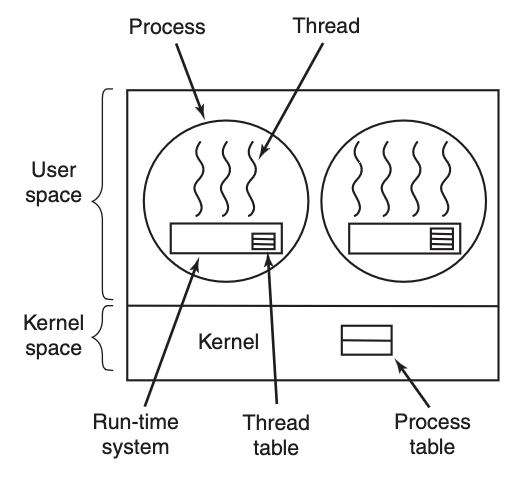Abstract

- Thread is managed in the User Space entirely. The thread is running on top of a Runtime System. An User Thread Library like is used to implement the thread
- Each process needs its own private Thread Table, unlike thread table managed by kernel for kernel thread
- The Kernel knows nothing about them. As far as the kernel is concerned, it is managing single-threaded Process (进程)
Good Compatibility
Thread can be implemented on an kernel that does not support threads.
Great Performance
Thread switching is at least an order of magnitude faster than trapping to the kernel. No Trap Interrupt (陷入) and Context Switch are needed. The CPU Cache also don’t need to be flushed.
Easy to customise
Each Process can have its own customized Process Scheduling Algorithms without the need to modify the kernel codes.
Better Scalability
Kernel Thread require some table space and Stack Segment in the Kernel, which can be a problem if there is a very large number of threads.
Declined Performance
Since Kernel sees a Process with multiple user threads as one single thread, when the running user thread has a Page Fault, other user threads can’t be scheduled to run.
Risk of Thread Hogging
If an user thread starts running, no other User Thread in that Process will ever run unless the first thread voluntarily gives up the CPU. Within a single process, there are no Interrupts (中断), making it impossible to schedule processes round-robin fashion.
Implementing Interrupts (中断) in Runtime System is resource intensive.
When thread is blocked locally
Thread calls the Runtime System to check if the thread must be put into blocked state. If so, Runtime System stores the thread’s registers (i.e., its own) in the thread table and looks in the table for a thread that is ready to run.
Runtime System
- Contains a Thread Scheduler in User Space for User Thread
Scheduler Activations
- Instead of relying on the Kernel for every thread management decision, the Runtime System is responsible for scheduling Thread
- Mitigates inefficiency from Kernel
Goroutines
- User Thread managed by the Go runtime. This design decision allows goroutines to be lightweight(2kb) and efficiently multiplexed onto a smaller number of Kernel Thread
- The Go runtime scheduler handles the mapping of goroutines to kernel threads, utilizing techniques like multiplexing and asynchronous I/O to optimize performance
- Refer to here for more information
Spinning up Goroutine
go <function_call>- creates a User Thread managed by Go runtime- The program below simulates retrieving data from a Database. Each retrieval takes
500ms. But the total execution time is around10µs. Continue reading to find out why :). You can remove thegokeyword to see the performance boost goroutine brings
Program exits before other goroutines finish!
We need to introduce Synchronization (同步) mechanism here to ensure the program only exists when all other goroutines finish running. Uncomment the code blocks in the editor above to add in the synchronization mechanism.
sync.WaitGroup- a Synchronization mechanism used to coordinate the completion of multiple goroutines. It acts like a counter that multiple goroutines can interact with.
Add(int)- increments the counter by a specified value, indicating the number of goroutines you will be waiting for
Done()- decrements the counter. Used by each goroutine when it finishes
Wait()- blocks the current goroutine until the counter reaches zero, signaling that all tracked goroutines have completed
Regarding the performance gainz
The above example shows a significant performance gainz - 5 iterations that take
500mseach finish in500ms! If you increase the number of iterations, it should still complete in about500ms. Give it a try! This thanks to Concurrency (并发) and the lightweight nature of User Thread.However, this performance gainz are only for not CPU-bounded tasks like Async IO. The performance gainz declines gradually as the tasks require more CPU power to complete. For non CPU-bounded tasks, they can run in concurrently without needing attention from the CPU. In the code editor below, change the value of
iin themain()from100to1000, you should observe the time taken 10X!
